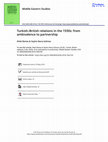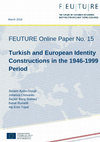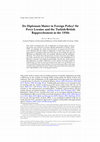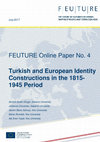Papers by Seckin Baris Gulmez
Turkish Studies, 2008
Page 1. Turkish Studies Vol. 9, No. 3, 423436, September 2008 ISSN 1468-3849 Print/1743-9663 Onl... more Page 1. Turkish Studies Vol. 9, No. 3, 423436, September 2008 ISSN 1468-3849 Print/1743-9663 Online/08/030423-14 © 2008 Taylor & Francis DOI: 10.1080/ 14683840802267389 The EU Policy of the Republican People's Party: An Inquiry on the ...
Global Power Europe - Vol. 1, Mar 1, 2013
This chapter is a theoretical attempt to study the multifaceted authority of the European Union (... more This chapter is a theoretical attempt to study the multifaceted authority of the European Union (EU) in world politics. Authority is legitimated power. Without legitimacy, power often faces severe resistance whereas legitimate actions and actorness imply less opposition if not widespread support. Informed by the thesis of Steven Lukes on three-dimensional power and Mark Suchman’s trichotomy of legitimacy, this chapter advances three dimensions of the EU’s authority in the world and discusses how the EU could maintain and/or restore its legitimacy in the global arena.
Gülmez, S.B., Buhari-Gülmez, D.B. and Dursun, M. (2020) “Trump Dönemi Türk-Amerikan İlişkilerine ... more Gülmez, S.B., Buhari-Gülmez, D.B. and Dursun, M. (2020) “Trump Dönemi Türk-Amerikan İlişkilerine Neoklasik Realist Yaklaşım” [A Neoclassical Realist Approach to Turkish-American Relations in the age of Trump] in E. Sıvış (ed.) Türk-Amerikan İlişkilerinde Değişen Dengeler: Dün-Bugün [Shifting Balances in Turkish-American Relations: Past and Present], Ankara: Libra.
Makaleye erişim için baris.gulmez.2009@live.rhul.ac.uk adresine email atabilirsiniz.
Uluslararası İlişkiler, 2019
Makalenin tam metni için baris.gulmez.2009@live.rhul.ac.uk adresine email atabilirsiniz.
Bu çalışma, ulusal çıkarları ön plana alarak güce ve tehdide dayalı bir dış politika imajı çizen ... more Bu çalışma, ulusal çıkarları ön plana alarak güce ve tehdide dayalı bir dış politika imajı çizen Çin’in, bunun tersine, uluslararası çevre rejimine saygılı bir yaklaşım ile çevre diplomasisini benimsemesinin nedenlerini tartışmayı amaçlamaktadır. Bu bağlamda, çalışmanın ilk bölümünde Realist ve Liberal kuramların temel dış politika argümanları (Raison d’etat ve Raison de Systeme) karşılaştırılacaktır. İkinci bölümde, Çevre diplomasisinin ana esasları ele alınacak ve üçüncü bölümde, Çin’in genel dış politika yaklaşımı temelinde Çevre diplomasisindeki gelişmeler incelenecektir. Sonuç bölümünde ise, Çin’in Çevre diplomasisinin Raison d’etat ve Raison de Systeme tartışmalarındaki konumu daha net ortaya konulacak ve “Çin’in dış politikası Liberalleşiyor mu?” sorusuna yanıt aranacaktır.

This article aims to explain how Britain and Turkey managed to establish a partnership in the sec... more This article aims to explain how Britain and Turkey managed to establish a partnership in the second half of the 1930s despite the fact that they could not agree upon a common rival to stand against. Britain and Turkey were enemies during the First World War and Turkey's War of Independence, and British-Turkish relations remained problematic after the proclamation of the Turkish Republic in 1923. The disagreement over the legal status of Mosul in Northern Iraq increased tension between Britain and Turkey in the mid-1920s. Nevertheless, the 1930s followed by the World Economic Crisis led to radical political formations such as Nazi Germany and Fascist Italy. Therefore, the changing international political environment forced Britain and Turkey to seek partnerships against these emerging rivals. There is an agreement in the scholarly literature that an increasing Turkish fear of Italian revisionism resulted in a bilateral partnership between Turkey and Britain. 1 Especially, the Italian invasion of Abyssinia in 1935 forced Turkey to seek partnership with Britain to prevent Italian aggression over Anatolia. 2 Some sources also claim that Turkey sought British partnership to escape the economic and political domination of Germany. However, what the existing literature overlooks is that a British-Turkish partnership became possible even though Britain and Turkey failed to agree upon a common rival. The prevailing International Relations literature highlights the existence of a common enemy as an essential requirement for alliance formation in world politics. The paradox underlying the British-Turkish partnership was the absence of a common enemy. Britain was mainly disturbed by the revisionist policies of Germany, while Turkey was threatened by Italy's aggressive policy over the Mediterranean. On the other hand, Britain did not consider Italy a crucial threat, and Germany did not constitute an immediate threat for Turkey, either. Nevertheless, Britain and Turkey managed to form a partnership despite having diverging threat assessments. The article aims to unravel this conundrum by drawing upon both the British and the Turkish perspectives.

This FEUTURE paper focuses on Turkey’s and Europe’s perceptions of each other in identity and cul... more This FEUTURE paper focuses on Turkey’s and Europe’s perceptions of each other in identity and cultural terms between 1946 and 1999. It identifies the identity representations developed by both sides in response to key selected political and cultural drivers of this period by subjecting selected newspaper articles and editorials as well as popular journals in Europe and Turkey to Critical Discourse Analysis (CDA). Identity representations are then discussed in relation to the pre-identified focal issues in the relationship; namely nationalism, status in international society, civilisation and state-citizen relations. The study finds that mutual identity representations in Turkey and Europe continue to be contested in this period. Yet, a growing convergence of English, French, and German representations of Turkey is observed on the European side whereas divergence of representations of Europe grows
on the Turkish front. While the establishment of the conception of multiple civilizations in both Europe and Turkey as well as the rise of nationalism in both contexts make it harder to justify policies aiming
at convergence throughout this period, it is observed that the rise of identity representations that focus on state-citizen relations have consistently supported convergence and that European identity
representations that focus on Europe’s status in international society have generally supported cooperation with Turkey in this period. Conversely, Turkish identity representations focusing on Turkey’s status in international society have become polarized and were employed in ways that justified both conflict and cooperation/convergence with Europe.

This article scrutinizes the role of diplomats in foreign policy by focusing on the case of Sir P... more This article scrutinizes the role of diplomats in foreign policy by focusing on the case of Sir Percy Loraine, British Ambassador to Turkey (1934-1939). Accordingly, the article first introduces an agent-centered framework claiming that the ability of diplomats to make their mark on foreign policy is contingent upon how they fare in overcoming two types of dilemmas on diplomatic duty: the mandate dilemma and the allegiance dilemma. The article then discusses how Loraine overcame these dilemmas with a particular focus on his mediating role in the establishment of bilateral economic and political partnership. Overall, the article argues that diplomats can make a difference in the conduct of foreign policy by influencing not only the host government but their own government as well, provided that they find a balance between following orders and using own discretion; and between their loyalty to the government they represent and responsibility to the receiving government.

This FEUTURE paper focuses on Turkey's and Europe's perceptions of each other in identity and cul... more This FEUTURE paper focuses on Turkey's and Europe's perceptions of each other in identity and cultural terms between two periods: 1789-1922 and 1923-1945. It identifies the identity representations developed by both sides in response to key selected political and cultural drivers of these periods by subjecting the writings of prominent Ottoman bureaucrats and intellectuals in the first period as well as newspaper articles and editorials in Europe and Turkey in both periods to Critical Discourse Analysis (CDA). Identity representations are then discussed in relation to the pre-identified focal issues in the relationship; namely nationalism, status in international society, civilisation and statecitizen relations. The paper finds that there is no linear pattern to identity representations that are constantly contested in both the Turkish and European contexts. Certain positive and negative events trigger identity representations in novel ways, feeding into a set of relations which can be identified by conflict, convergence or cooperation.

Turkish foreign policy as an anomaly: revisionism and irredentism through diplomacy in the 1930s, 2017
This article discusses why Turkey persisted in diplomacy in the pursuit of a proactive foreign po... more This article discusses why Turkey persisted in diplomacy in the pursuit of a proactive foreign policy during the 1930s while use of force and unilateral action were the popular alternatives. Accordingly, first, the prevailing literature will be examined outlining five primary foreign policy practices of the time, namely, revisionism, irredentism, bandwagoning, appeasement and isolationism. The article will then discuss the foreign policy preference of Turkey which stands as an anomaly in comparison to its contemporaries, focusing on two main cases: Turkey's reacquisition of the Straits and the accession of Alexandretta. After analysing the underlying factors behind Turkey's persistent attachment to multilateral and bilateral diplomacy, the article will conclude by applying the term 'Holder of Balance' to Turkish foreign policy in the 1930s. Overall, it is argued that the Great Depression attributed a new role to Turkey, the holder of European balance, enabling partnership with both aggressors and appeasers and thus facilitating the settlement of disputes through diplomacy.

Uploads
Papers by Seckin Baris Gulmez
Makaleye erişim için baris.gulmez.2009@live.rhul.ac.uk adresine email atabilirsiniz.
on the Turkish front. While the establishment of the conception of multiple civilizations in both Europe and Turkey as well as the rise of nationalism in both contexts make it harder to justify policies aiming
at convergence throughout this period, it is observed that the rise of identity representations that focus on state-citizen relations have consistently supported convergence and that European identity
representations that focus on Europe’s status in international society have generally supported cooperation with Turkey in this period. Conversely, Turkish identity representations focusing on Turkey’s status in international society have become polarized and were employed in ways that justified both conflict and cooperation/convergence with Europe.
Makaleye erişim için baris.gulmez.2009@live.rhul.ac.uk adresine email atabilirsiniz.
on the Turkish front. While the establishment of the conception of multiple civilizations in both Europe and Turkey as well as the rise of nationalism in both contexts make it harder to justify policies aiming
at convergence throughout this period, it is observed that the rise of identity representations that focus on state-citizen relations have consistently supported convergence and that European identity
representations that focus on Europe’s status in international society have generally supported cooperation with Turkey in this period. Conversely, Turkish identity representations focusing on Turkey’s status in international society have become polarized and were employed in ways that justified both conflict and cooperation/convergence with Europe.